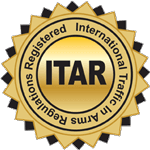Mechanical flight relies on specialized high-precision components critical to the functionality, safety, and reliability required from a commercial aircraft, eVTOL aircraft, or spacecraft. As a result, aerospace manufacturers must maintain incredibly high standards in their manufacturing methods and assembly techniques that follow strict international quality standards. Due to this, aerospace components and assemblies must be manufactured within micron tolerances by numerically controlled machines. Production requires highly sophisticated automation to maintain repeatability and standardized work practices to ensure product consistency. Then, all geometries must be verified by coordinated measuring machines for precision verification and documentation of manufactured parts and assemblies. These key protocols ensure components meet the aerospace industry’s strict functional and regulatory requirements according to AS9100 standards.
Aerospace Machining and Manufacturing Techniques
The advent of Computerized Numerical Control (CNC) machining allowed significant innovation within the aerospace industry. CNC machining is now an essential process in the aerospace industry. The precision and capabilities of CNCs allow us to manufacture the complex and intricate components used in modern aerospace and new space designs. There are several different styles of CNCs used within aerospace machining companies. CNC technology has been integrated into mills, lathes, plasma, laser, water jet cutters, and electrical discharge machining (EDM). Today’s designs require a combination of these machines to be used in manufacturing one individual component. CNC machining aerospace parts is no longer possible using a few basic mills and lathes. Companies must have an abundance of processes and capabilities at hand to serve today’s industry properly.
Multi-Axis CNC Machining for Aerospace Parts
Since aerospace machining involves making highly complex components and those with complex geometries, advanced solutions must ensure they’re produced accurately. Modern-day multi-axis CNC machines offer the functionality and capabilities required with CNC machining aerospace parts with the innovative design trends we see today. The current market in 2022 offers multi-axis machines with configurations between 3 to 12 axis to meet today’s manufacturing requirements. The 5-axis CNC marked the pinnacle of innovation in 21st-century machining techniques and is a necessary tool for any legitimate aerospace manufacturer. The 5-axis machine allows pivoting and rotation movements to accommodate modern design complexities. The machine’s simultaneous translation and rotational movements allow precise machining of intricate parts and complex tool designs.
Ready to automate your next job?
VIEW OUR EQUIPMENTSignificance of Computer-Aided Design and Manufacturing
One of our industry’s most critical engineering tools today is Computer-aided Design (CAD) and Computer-aided Manufacturing (CAM) software packages. To keep this simple, CAD is the software package used in the creative design of a product. The software outputs a 2D or 3D model of the product dimensions and tolerances that are, in turn, used for manufacturing planning. The CAM software package has traditionally been considered the programming tool for CNCs. CAM software takes the CAD model and generates the G-code used in CNC machining. CAM’s primary role in aerospace manufacturing is to create the most efficient production process that capitalizes on the capabilities and tooling of a machine while holding more precise dimensional tolerances and minimizing waste.
Importance of Advanced Automation and Manufacturing Techniques
Automation used within aerospace manufacturing plays a big role in the machining centers. Automated cells composed of robotics, measurement, and vision systems are crucial to the productivity and quality of an aerospace manufacturer. Integrated error-proofing techniques such as vision systems or laser profilers help ensure all components meet the design standard efficiently. Coordinated measuring machines (CMM) and optical profilometers with tight measuring tolerances, often to 0.1µm resolution, are required to verify dimensional tolerances with aerospace machining and manufacturing.
Importance of Skilled Professionals
A key component of any industry is a competent team of professionals. Leading-edge design requires skilled and innovative engineers to execute. Modern software packages such as CAD and CAM do not eliminate the need for skilled professionals such as manufacturing engineers, NC programmers, or machinists. These software packages leverage the value of the most skilled manufacturing professionals through advanced productivity tools while simultaneously building the skills of new professionals through visualization, simulation, and optimization tools. The complexity of today’s modern machining tools, automation, and strict regulatory guidelines of the International Aerospace Quality Group.
Quality and the AS9100 Regulatory Requirements of Aerospace
An international aerospace standard known as AS9100 was first introduced in 1999 by the International Aerospace Quality Group (IAQG). Based on the ISO 9001 international standard for quality management, AS9100 was specifically designed for aviation, defense, and spaceflight organizations. These requirements are recognized globally and are sponsored by the International Organization for Standardization (ISO). Major aerospace manufacturers and suppliers require internal quality system compliance and registration to AS9100 as a general condition of doing business within the sector. This set of standards is a series of specific criteria that provide international consistency and address the specific regulatory, safety, and reliability requirements demanded by the commercial aerospace sector. The AS9100 standard has gone through multiple revisions since its conception. AS9100 Revision D includes the full text of ISO 9001:2015, with some key additions to product safety standards, risk clauses, and counterfeit parts prevention.
Ready to talk about your next project?
CONTACT US TODAYStaub’s Innovation in Aerospace Machining, Manufacturing, and Automation
Staub Precision Machine, Inc is a premiere aerospace manufacturer specializing in volume aerospace machining and assembly. Staub has close to a half-century of manufacturing experience for some of the largest aerospace and medical industry players. We have a focus and cooperation for innovation with our customers. We provide collaborative solutions through our sophisticated machinery and cutting-edge systems to best meet our customers’ production needs. Our full catalog of equipment and automation solutions allows us to provide results regardless of complexity. Inquire about your next project with the advanced manufacturing experts at Staub today.



